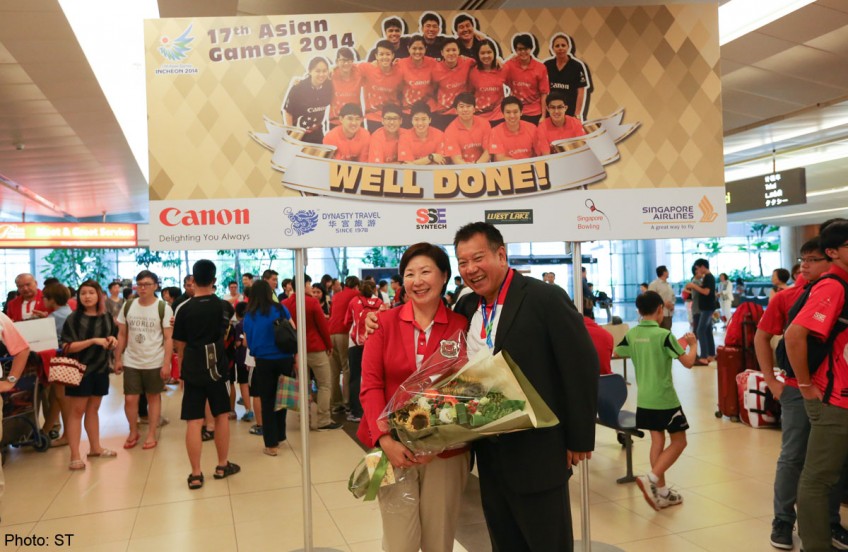Asian Games: Male bowlers on her mind


Emerging from the gate at Changi Airport Terminal 2 yesterday afternoon, Jessie Phua was beaming as she waved at an approximate crowd of 150 people gathered to welcome home the Singapore bowling contingent from the Asian Games in Incheon.
On the back of what she described as a brilliant performance by Team Singapore - the contingent returned home with five gold medals, six silver and 13 bronze medals to finish in 15th spot in the standings - Phua, the chef de mission was in good spirits.
A reminder of the unsavoury incident involving three swimmers at the Games, however, wiped the smile off Phua's face, for a brief moment.
Last week, Joseph Schooling, Roanne Ho and Teo Zhen Ren returned to the Games Village in Incheon after a night out, intoxicated.
The trio had not sought permission to leave the village and are in danger of sanctions after an investigation by the Singapore National Olympic Council is completed.
When asked if there was a time line for the panel to make its disciplinary recommendations, Phua declined comment.
"I don't want to rain on their parade," she said, referring to the bowlers, who were adorned with gifts and hugs from their loved ones at the airport.
Phua, who is also president of the Singapore Bowling Federation, was at least candid about her bowlers' performance.
After a shaky start, the women's team returned home with a respectable medal haul of one gold, two silvers and a bronze.
The men's performance, on the other hand, was, as she described it, disappointing.
The squad of Keith Saw, Ng Chiew Pang, Justin Lim, Muhammad Jaris Goh, Joel Tan and Javier Tan returned home empty-handed.
The trio of Saw, Lim and Ng did come within a whisker - 14 pinfalls - of a bronze when they finished fourth in the men's trios event.
HIGH EXPECTATIONS
"I pull no punches when it comes to my bowlers. I have very high expectations of them, (and) I expected more medals," said Phua, who has been in charge of the national sports association since 2002.
"But the boys were 14 pinfalls from a bronze, so they weren't exactly out of their depth.
"I believe that this can be a fantastic team for the future; all they need is more game experience and to be more battle-hardened."
Phua revealed that she had to step in and give the keglers the hair-dryer treatment after watching their barren outing in the doubles event.
"I couldn't recognise them; everything about them was off, even their pre-shot routines," Phua said.
"I can accept losing and no medals, but I have no room for athletes who run scared of their opposition. I told them that and was pleased with their response because they came out fighting."
"The men's team were overawed in Korea, but I believe they will become a group who can compete with the best."
"After a short break, Remy (Ong, national bowling coach) and the other coaches will look at what went wrong and see how we are going to fix it."
"Remy is harder on them than I am, and he wants to bring the boys up shoulder to shoulder with the women's team."
Make selection criteria better
While Singapore's chef de mission Jessie Phua praised the collective performance of Team Singapore in Incheon, she also highlighted the need to improve the selection criteria for athletes for future Games.
Team Singapore sent 223 athletes to the Asian Games and the contingent returned with two Asian Games records, three national marks and 13 personal bests.
But there were also performances which were far off the mark.
The men's hockey team finished ninth out of 10 teams, after targeting at least seventh spot, while the women's 7s rugby side were on the wrong end of 60-0 and 43-0 drubbings at the hands of Japan and China, respectively.
Though Phua declined to say if the Singapore National Olympic Council will be more stringent with its selection policy in the future, she said lessons must be learnt.
"Moving forward, we can do better, including our selection criteria," she said.
"For some sports, the lack of competition prior to a major Games makes it difficult for them to achieve, or even set, a fifth- or sixth-placed target.
"Some sports have to arrange friendlies in order to meet requirements - that's how football made the cut.
"It's important we also consider athletes who are on a fast track, though not in the top six of their sport.
"Some of these athletes should still be given the opportunity to compete on the world stage, then we can see if they are motivated to do better."
aakasim@sph.com.sg

This article was first published on Oct 6, 2014.
Get The New Paper for more stories.